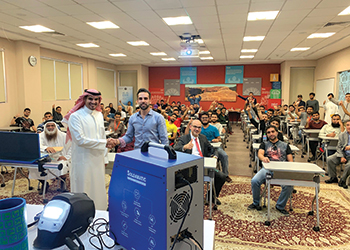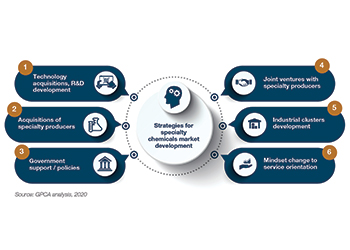
 The GCC's specialty chemicals market can be developed using various strategies
The GCC's specialty chemicals market can be developed using various strategies
Regional companies need to employ key strategies to succeed in the specialty chemicals business, and cannot afford to miss out on the potential of unlocking these opportunities, says a GPCA report
The evolution of the GCC chemical industry over the past decades has been a success story with growth rates exceeding that of GDP, making it an attractive market for investors.
A diversification drive, the development of GCC's manufacturing industry, and the high export potential, are all creating an opportunity to develop a dynamic specialty chemicals industry for the region.
In its report, ‘Unlocking the Potential of a Specialty Chemicals Industry in the GCC’, the Gulf Petrochemicals and Chemicals Association (GPCA) gives an overview of the specialty chemicals sector globally and in the GCC. The report outlines the prevailing trends in the specialty chemicals market and what the GCC region could do in order to speed up the development of the specialty chemicals market.
The specialty chemicals market is referred to as one of the "most important chemical segments" because of the end user industrial demand solutions, which are only possible through materials provided by the specialty chemicals sector.
These chemicals are essential in various industries, ranging from construction, food, textiles to cosmetics, and are attributed to deliver better safety, ensure regulatory compliance, and improve performance. Specialty chemicals are also fundamental to protecting public health, and providing medical supplies and other products that are vital during global outbreaks, such as the recent coronavirus (Covid-19) pandemic.
In 2018, the global specialty chemicals market generated $1.2 trillion in sales, which was 31 per cent of total $3.9 trillion in sales generated by the chemical industry. Specialty chemicals sales are projected to further increase to $1.4 trillion by 2025.
That said the industry is facing several key challenges, including continuous product diversification which is leading to the commoditisation of many specialty products. Furthermore, the industry is facing changing demand patterns, an evolving nature of innovation, a highly regulated industry, sustainability and digitalisation drive, and price pressure. All these challenges are discussed in detail in the current report.
GCC SPECIALTY CHEMICALS SECTOR
Despite the importance of the specialty chemicals sector for the future development of the GCC, there is no data on the actual market size in the region. Several companies are focusing on individual segments of specialty chemicals, but market information on the entire industry in the GCC is non-existent.
Based on GPCA’s estimates, the GCC specialty chemicals industry has an output worth of $10-11 billion, which represents less than 1 per cent of the global output. In 2018, the GCC region imported 2.3 million tonnes of specialty chemicals valued at $6.5 billion, which represents about 12 per cent of total chemical imports by volume and 25 per cent by value during the same year. GPCA estimates the GCC region imported close to 3 million tonnes of specialty chemicals in 2019.
The GCC chemical industry is at a turning point. The region has experienced decades of exceptional growth and built a vibrant and competitive chemical industry. However, as governments seek to diversify economies and attract industrial investment, there are new strategic priorities for the chemical industry. The industry has been tasked to capture the value that is currently captured by overseas customers.
There are several development options that will allow a steady diversification of commodity producers to specialty chemicals. These include technology acquisition, R&D development, acquisitions of specialty chemicals companies, joint ventures with specialties producers, industrial cluster developments, mindset change to service orientation, and greater support from the government.
There are some key obstacles in the development of the region's industrial sector in general and by extension the specialty chemicals. Some of the biggest challenges are: the limited size of a regional end-user market, technological entry barriers (as specialty technologies are often proprietary), limited R&D capability in the region, and the high logistics costs associated with exporting to end-user markets. Each of these challenges are reviewed in the report.
In conclusion, GCC chemical players need to employ a number of instruments to succeed in the specialty chemicals business. Companies that have the ability and willingness to make necessary moves will be better placed for success in the fast-evolving specialty chemicals market.
Established in 2006, the Gulf Petrochemicals and Chemicals Association (GPCA) represents the downstream hydrocarbon industry in the GCC. It has more than 250 member companies from the chemical and allied industries, accounting for over 95 per cent of chemical output in the Gulf region. The industry makes up the second largest manufacturing sector in the region, producing over $108 billion worth of products a year. GPCA manages six working committees: Plastics, Supply Chain, Fertilisers, International Trade, Research and Innovation, and Responsible Ca








































































